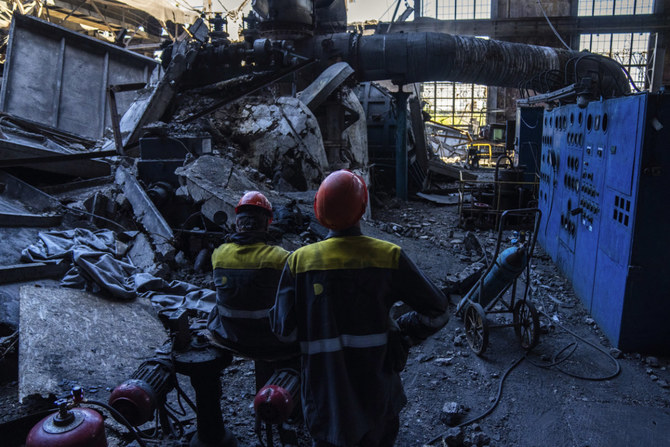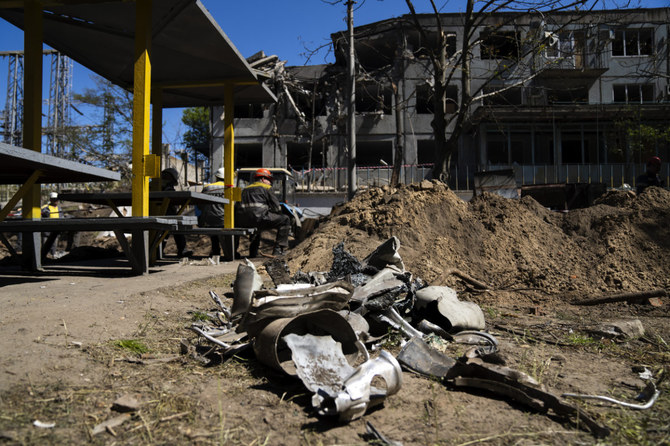KYIV, Ukraine: At a Ukrainian power plant repeatedly hit by Russian aerial attacks, equipment department chief Oleh has a one-word answer when asked what Ukraine’s battered energy industry needs most: “Patriot.”
Ukrainian energy workers are struggling to repair the damage from intensifying airstrikes aimed at pulverizing Ukraine’s energy grid, hobbling the economy and sapping the public’s morale. Staff worry they will lose the race to prepare for winter unless allies come up with air-defense systems like the US-made Patriots to stop Russian attacks inflicting more destruction on already damaged plants.
“Rockets hit fast. Fixing takes long,” Oleh said in limited but forceful English.
The US has sent Ukraine some Patriot missile systems, and said last week it would give more after entreaties from President Volodymyr Zelensky.
The Associated Press on Thursday visited a plant owned by DTEK, the country’s biggest private energy supplier, days after a cruise-missile attack left parts of it a mess of smashed glass, shattered bricks and twisted metal. The coal-fired plant is one of four DTEK power stations struck on the same day last week.
The AP was given access on the condition that the location of the facility, technical details of the damage and workers’ full names are not published due to security concerns.
During the visit, State Emergency Service workers in hard hats and harnesses clambered atop the twisted roof of a vast building, assessing the damage and occasionally dislodging chunks of debris with a thunderous clang.
Ukrainian Foreign Minister Dmytro Kuleba told Foreign Policy magazine that half of the country’s energy system has been damaged by Russian attacks.
DTEK says it has lost 80 percent of its electricity-generating capacity in almost 180 aerial attacks since the start of Russia’s full-scale invasion in 2022. It estimates that repairing all the damaged plants would take between six months and two years — even if there are no more strikes.
Shift supervisor Ruslan was on duty in the operations room when the air alarm sounded. He sent his crew to a basement shelter but remained at his post when the blast struck only meters (yards) away.
He rushed out to darkness, dust and fire. He said he wasn’t scared because “I knew what I needed to do” – make sure his team was OK and then try to help put out the flames.
Russia pummeled Ukraine’s energy infrastructure to devastating effect during the “blackout winter” of 2022-23. In March it launched a new wave of attacks, one of which completely destroyed the Trypilska power plant near Kyiv, one of the country’s biggest.
Russian President Vladimir Putin has framed the attacks as retaliation for Ukrainian strikes on Russian oil refineries.
Oleh said the Russians are “learning all the time” and adapting their tactics. Initially they targeted transformers that distribute power; now they aim for the power-generating equipment itself, with increasing accuracy. The Russians also are sending growing numbers of missiles and exploding drones to exhaust Ukraine’s air defenses, and striking the same targets repeatedly.
DTEK executive director Dmytro Sakharuk said in March that out of 10 units the company had repaired after earlier strikes, two-thirds had been hit again.
More Russian missiles have been getting through in recent months as Ukraine awaited new supplies from allies, including a $61 billion package from the US that was held up for months by wrangling in Congress. It was finally approved in April, but it could be weeks or months before all the new weapons and ammunition arrives.
Ukraine’s energy firms have all but exhausted their finances, equipment and spare parts fixing the damage Russia has already wrought. The country’s power plants urgently need specialist equipment that Ukraine can no longer make at sufficient speed and scale.
Some 51 DTEK employees have been wounded in attacks since 2022, and three have been killed. Staff say they keep working despite the danger because they know how crucial their work is.
Machine operator Dmytro, who was on shift during the recent attack and took shelter in the basement, said that when he emerged, “my soul was bleeding when I saw the scale of the destruction.”
He thought of the many people who had poured heart and soul into building the mammoth power plant.
“This was destroyed in a few seconds, in an instant,” he said.
Dmytro, who worked at Ukraine’s Zaporizhzhia nuclear power plant before it was seized by Russia, said he would continue to show up for work every day, “as long as I’m able.”
“It’s our duty toward the country,” he said


























